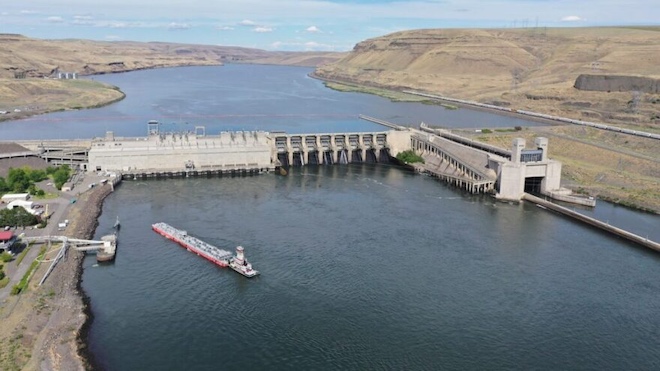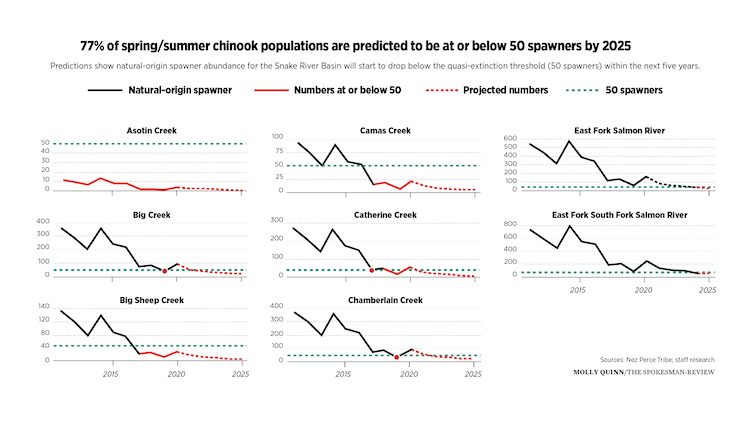forum
library
tutorial
contact

Federal-state-tribal Agreement Aims to Help Salmon,
Leaves Future of Snake River Dams Open
by Brandon Hollingsworth
Spokane Public Radio, December 15, 2023
|
the film forum library tutorial contact |

|
Federal-state-tribal Agreement Aims to Help Salmon,
by Brandon Hollingsworth
|
Inslee and White House advisor John Podesta said any decision about
breaching the lower Snake River dams would have to come from Congress.
 The federal government, the states of Washington and Oregon, and tribal authorities have agreed to change the way parts of the Columbia River basin are managed. The agreement announced Thursday promises funding for salmon restoration efforts, pauses lawsuits over federal management of the basin, and leaves open the future of four dams on the lower Snake River.
The federal government, the states of Washington and Oregon, and tribal authorities have agreed to change the way parts of the Columbia River basin are managed. The agreement announced Thursday promises funding for salmon restoration efforts, pauses lawsuits over federal management of the basin, and leaves open the future of four dams on the lower Snake River.
Under the agreement, the Bonneville Power Administration will spend $300 million over a ten-year period for fish and habitat restoration. The U.S. Department of Energy will help tribes develop plans for tribally-sponsored clean energy projects. The federal government will also adjust the flow of water through dams to help benefit some fish while keeping up with demand for electric power.
The agreement does not dictate whether to keep or dismantle a quartet of dams along the lower Snake River in eastern Washington.
The dams are at the center of contention between tribal leaders who say the concrete bulwarks are contributing to the demise of salmon species, and political, agricultural and economic interests that say the dams are vital for power, recreation, irrigation and shipping. The settlement pledges funding for studies that could outline how to replace the services the dams currently provide.
Speaking during a press conference Thursday, leaders from the Nez Perce, Yakama, Warm Springs and Umatilla tribes said they hoped the agreement could lead to breaching the dams, though they acknowledged doing so would be thorny.
"We support removal of the lower Snake River dams," said Corinne Sams, a member of the Confederated Tribes of the Umatilla Indian Reservation trustees board. "But we also recognize that if we are to remove those dams, we have to replace the benefits of those dams."
 Washington Gov. Jay Inslee said more information is needed to make an informed decision.
Washington Gov. Jay Inslee said more information is needed to make an informed decision.
"No one who has thought about this for ten nanoseconds would think that we could pull the rug out from the whole state of Washington -- with our electrical needs from these dams, our irrigation needs from the dams, our recreation needs from the dams, our transportation needs from the dams -- without having a plan for how to replace those services," Inslee said.
Some Congressional Republicans recently accused the Biden administration and participants in the settlement negotiations of setting the stage for breaching the dams. This week, Oregon Republican Cliff Bentz called the negotiation process a "destructive, politicized, unfair, and deceptive scheme to ultimately remove the four lower Snake River Dams."
Inslee and White House advisor John Podesta said any decision about breaching the lower Snake River dams would have to come from Congress.
"The [Biden] Administration... is not making a judgment on whether to breach the dams, nor does it have the authority to do so," the White House said in a statement.
Northwest Congressional members do not agree about whether to keep the dams intact or breach them. Republican Congresswoman Cathy McMorris Rogers, whose eastern Washington district includes the dams, opposes their removal.
A separate agreement reached in September pledged federal support for salmon restoration in the upper Columbia River basin. That arrangement included the Confederated Tribes of the Colville Reservation, the Spokane Tribe and the Coeur d'Alene Tribe.
learn more on topics covered in the film
see the video
read the script
learn the songs
discussion forum
